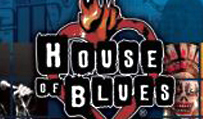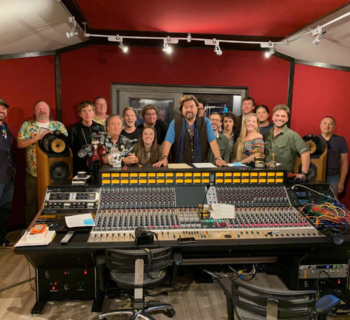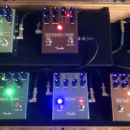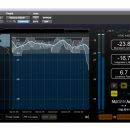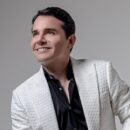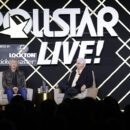On stage, Tame Impala is a band, but in the studio and at its heart, it is the life’s work and vision of Kevin Parker, a native of Perth, Australia, who writes all the songs and plays all the instruments and handles all the production. He uploaded some of his music to MySpace in 2007 and was signed to the nation’s hippest label, Modular Recordings, who quickly released his self-titled EP, followed by his debut album InnerSpeaker, now celebrating its 10-year anniversary.
Out of the gate he was a neo-psychedelic garage rocker displaying influences of ‘60s bands like Nazz, The Beatles and The Who, but always adventurous, and always evolving, Parker’s music has gone much more in the direction of electronic pop, some tracks more at home on the dancefloor than the headshop.
His list of collaborations, many of them with hip-hop artists, is also as surprising as it is impressive: the likes of Travis Scott, SZA, Lady Gaga, Mark Ronson, Kanye West, Kali Uchis, Theophilus London, A$AP Rocky and Kendrick Lamar are just the tip of the iceberg; and Parker was also working the nightshift on The Weeknd’s After Hours with Oneohtrix Point Never.
Parker was set to promote his fourth album, The Slow Rush (for Interscope, his new label home), when COVID crashed the party, so for now, along with Jay Watson and Don Simper, he presented a stripped down, drum machine and synth version of the band, known as the Tame Impala Soundsystem, on The Tonight Show with Jimmy Fallon.
We caught up with Parker at his new home in the forests near Perth where he talked about his career, gave some insights into his world and the industry, as well as his gorgeous, hypnotic, and introspective new album, one that somehow merges yacht rock and vaporwave, and uses the devices of time and nostalgia in an evocative way that’s similar to how Al Stewart and Alan Parsons did so brilliantly on 1978’s Time Passages.
Music Connection: Like many artists, you had big plans to go on the road to promote your latest album, and then there was COVID. How are you dealing with it?
Kevin Parker: Aside from the fact that it’s totally disruptive and obviously terrible that I can’t be playing shows for my fans, there’s a small part of me––a large part of me, actually––kind of gets a kick when the snow globe gets shaken up. I feel that creatively and artistically, at the moment, it’s kind of like there are no rules, you know? Like, whatever you want to do. Whatever you want to do and however you think you can continue doing what you love and bringing it to the world, you can do it. Do you want to do an internet concert? You can do that? Yeah, now it’s kind of like the pressure is off for it to be cool if you try something, just some sort of weird idea, everything from playing music to promoting your album. If you want to try something and it fails, it’s okay, because you gave it a go. That’s kind of how I feel about things right now.
MC: When you began, you had to learn how to navigate the rapid evolution of social media, from MySpace, where you were discovered, to Instagram. Do you think that the post-COVID world is another new landscape for the artist to navigate and create?
Parker: I think that if you make it your own and do with it what you want, then that’s kind of a way to be expressive with it. Obviously I know there are people who have done studies, there is data and stuff to suggest that there are better ways of doing it, but when I started putting my music on MySpace, I just put up songs when I’d finish them, and sometimes I’d make them downloadable just because I thought it was a good way to share my music. And I didn’t really care about making money off of it at that point. In fact, making money off music was never something that I had in the forefront in my mind. It was only when I signed a record deal that it became a factor.
Obviously, I got lucky. Anyone that’s successful in music got lucky. My music was found by the right people at the right time. I personally did not have to work as hard as some people did. The extreme hard work I’ve done was always to make the music good. But I think there are lots of ways to skin a cat.
MC: We recently interviewed Todd Rundgren, who I know you are a fan of. He mentioned that he’s been in touch with you to collaborate, but he wouldn’t be making any more LPs because of the state of the music business and the way listening habits have changed. He said it’s going back to when most artists focused on singles and compiled them into “albums.” What’s your take on that?
Parker: I don’t find myself old-school philosophically about music. I know some people hold the album in the highest regard in terms of formats of music; I do it because it’s a fulfilling thing to think about “the album.” I like to think about the start of an album, the middle of an album, and the end of an album. I like to think of it as a journey, because for me, if I wasn’t thinking about that there would be no point in making an album. It’s like making a movie versus making lots of individual scenes. It’s just an enjoyable way of looking at it.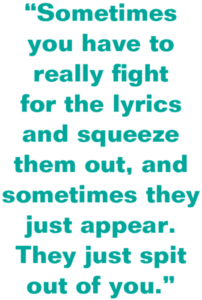
MC: Preparing for that article I saw another interview with you praising Todd’s classic album, A Wizard, a True Star. You come from a garage psychedelic pop-rock place, too, you are ambitious in the studio and eclectic with the genres like he is, so what can you tell us about the Rundgren influence on Tame Impala?
Parker: Totally, the phaser on the drums, his use of Major 7th chords. But it began with Nazz, which was him in the form of a band in the ‘60s. And it was that kind of melodic sensibility that he carried over into Todd Rundgren that was like the first Todd influence in my life. The melodic sensibility resonated with me in the Nazz more so than other ‘60s bands that I’ve been associated with, influence wise.
Of course, I also loved that it was something we’d never heard before, and you could tell that it was so ambitious; even though it was rock, it was more ambitious than that. I heard A Wizard, a True Star a couple years later when a friend got the tip-off in Japan. We put it on our record player, it just blew all our minds. “International Feel” was one of those songs that left me stunned. It’s like a piece of music that you’ve been looking for without realizing it. It was everything that we loved at that time and we hadn’t heard it yet. Like, after track one we were all standing in the room like what the fuck just happened? It became this sort of holy grail for us years after that.
MC: I asked him why he thinks so many younger bands look to his music for inspiration and he basically said it’s because they get bored of what they’re doing and what their contemporaries are doing, so they look to the past to inspire them to move forward. Is that true?
Parker: I always want to find new things to put into my music. I’m not sure if it’s because each time I do an album I want to do something new just because I want to do something new or because I [want to do something different from other bands].
Like, my friends tell me about bands that sound like Tame Impala, and those bands’ll use some features of my sound as something from a box; such as phased-out drums, or like Juno synthesizer. And I remember thinking that I don’t want the essence of Tame Impala to be something quantifiable, like a two-word thing. Like “Tame Impala? Yeah, do this.” That idea makes my skin crawl. I don’t want my sound
to be something that you can so easily put into words and replicate.
So, I guess that’s kind of why I have such drive to do something different each time. And also because, at the end of the day, I’m most excited by discovering something new, or put- ting a new element in my music. And it’s also sort-of more evocative to me. I’ll do whatever it takes to make evocative music. And it can be evocative of anything. Like, it can be evocative of a time, like a past decade or a place or a state of mind. I just love the idea of transporting, where I feel like I’m listening to it. My music is sometimes retro in nature, and that’s only because it’s evocative, there’s no other reason. It’s only because it transports me from where I am right now. It’s the same reason why I like playing video games. It comes from the same desire to be not here right now.
MC: You mention “retro” in a sort of nostalgic escapism way, which is also a theme on your new album The Slow Rush. Do you view your music as nostalgic escapism or escapist nostalgia?
Parker: For a long time I’ve openly talked about Tame Impala as being escapism music. In the same way that Lord of the Rings is escapism. Because you are lost in a world that does not intersect with our ordinary world. You know, for me, music is an escapism kind of thing. I get lost in worlds.
MC: It seems that people use nostalgia and escapism as a sort of medicine to deal with hard times, too. But in today’s context, can we be in a nostalgic, escapist dreamscape and also “woke” and socially aware?
Parker: It is funny, because there’s definitely more of an expectation to give a damn about the world and to not try to escape. I think that maybe escape has become a bit of a taboo. I guess there’s more of a sentiment that if you remove yourself from the world then that’s the same as not caring about the world, and then you are part of the problem and not the solution.
I’ve never seen Tame Impala as a political thing, but I do feel more and more everyone’s eyes are being opened to what’s really going on in the world and how it doesn’t have to be like that. There’s expectations but there’s also opportunities to help, and I guess I’m sort of trying to navigate the new way of doing that, and I’m learning how to continue to make escape music but also do what I value and what I see Tame Impala as being in the world. I want to do what’s right, and I want to be remembered as not someone who just washed their hands of it. Which is not to say that I do those things because of pressure.
I get pretty riled up about climate change. All those things where people are being fucked to each other is one thing, but us fucking up the planet is another thing, because it’s us making a problem that is bigger than us. It’s still difficult to navigate, so I’m learning. But it’s like in the Great Depression and World War II, movie tickets still went up, you know?
MC: Talk about the way you use nostalgia on the new record, but first, I’ve noticed that you are showing us how you go through some emotional and life transitions from the last record (Currents) to The Slow Rush. Can you take us through the emotional tracking of where you were to now?
Parker: I think the idea and feeling of change has always been really powerful for me. Especially one to put in music. Sometimes I’ll write a piece of music and it will remind me of a time when I felt my life was changing. And it’s such a specific emotion because it’s daunting and exciting and sad and happy at the same time. And it reminds me of times in my life when life was changing gears. And obviously between Currents and The Slow Rush there’s kind of an overlap of subjects. People call Currents a breakup album, but it really isn’t. There’s a situation that comes up in a lot of the songs, but it’s about something bigger than that. The breakup in that album is part of a bigger, personal transition.
MC: And on The Slow Rush it’s like this examination of your life using references to time as a device. Do you think you use this retro nostalgic trip through time as a way to explore all these other inner landscapes and concepts?
Parker: Yeah, that’s a good way of putting it. I’m going to remember that line for when somebody asks me. I guess, for whatever reason, since Currents came out, maybe it’s my life moving on, I’m thinking about the past, the future, and the present. It just kind of hits me. I’ve been having these really intoxicating feelings, like “shit where am I going to be in a year or 10 years?”
It’s something so banal as walking up to something in your house that’s covered in dust that you swear to god you only just cleaned the dust off yesterday, and you realize that it’s been like a year since you cleaned the dust off it. And you’re like, “shit, did a year just go like that?” Something so simple and meaningless as that can trigger that kind of feeling. So, it’s kind of that in combination with the kind of music I’ve been making; I’ve been getting into a lot of ‘90s house and that kind of beginning of bedroom house, and a lot of the chords and the pads are so evocative of dreaming. I guess a lot of things coming together created the platform for The Slow Rush.
MC: “Posthumous Forgiveness” is really soulful, almost in an Isaac Hayes or Marvin Gaye way in the beginning. And it packs an emotional punch. Can you talk about that song?
Parker: It’s funny, I’d love to tell you that I had a vision for it from the outset. I will write some chords and it will remind me of this and I‘ll just go with that. Or I’ll write a line of lyrics and it will remind me of something and I’ll go with it.
I did not start with that song being about my dad, and it did not start out having a kind of two-part thing, I sort of let the song dictate that. I reluctantly decided to write the lyrics about the idea of forgiving someone after they’re gone even though they don’t have a chance to explain themselves.
When you forgive someone who is dead, you don’t forgive them because they said sorry, it’s a one-sided thing, you just have to decide to forgive them for reasons that you console yourself with. And I was like, “oh shit I’ve gotta do it,” because I hate writing lyrics where I feel like I‘m trying to make people feel sorry for me. Only because I’m a naturally shy person so I don’t like to burden people with those kind of things, even though I’m an artist.
MC: I saw an interview where you talked about trying to open up more in your lyrics. Is that right?
Parker: Yeah. It’s not that I’ve decided to do it, but every time I do it, it is just a rewarding thing putting your emotions in a song, because even though you’re putting it on a thing for millions of people to listen to, it’s easier than talking about it. You know what I mean? It’s the easy way out.
And also, it’s easy because, personally, I’ve been holding on to those words and I never even talked about it. Sometimes you have to really fight for the lyrics and squeeze them out, and sometimes they just appear. They just spit out of you. Like you turn on the tap and they come out, and “Posthumous Forgiveness” was one of the songs.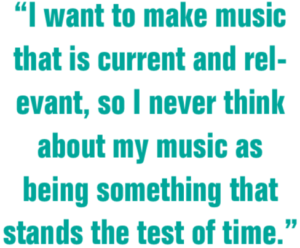
MC: That type of emotional authenticity you achieved makes the music timeless, so that it transcends other trends in music styles or gear, know what I mean?
Parker: Thanks, man. It’s so interesting because, when you’re making it, you have no way of gauging that, you know? You want it to be good, but you have no idea if it’s authentic or not, you’re just doing it because you want to do it. I guess that means it’s authentic, but it’s difficult to navigate that.
Honestly, I want to make music that is current and relevant, so I never think about my music as being something that stands the test of time. I feel like that’s a quick way to back yourself into a corner, that’s a quick way to gridlock yourself into thinking about it too deeply. So, I try to only think about the music as being relevant to now and something people will enjoy now and maybe they will in the future.
I get angry when I hear people say, like, people are just singing about the same things over and over, like “oh man, songs are always about the same things, like heartbreak or falling in love.” And I’m, like, well of course they are, because those are things that are relevant to everyone all the time. It’s not like songs have to slowly evolve in complexity of emotions. It’s just up to the artist to interpret that in different ways.
MC: You’re also celebrating the 10-year anniversary of your debut album, InnerSpeaker. What’s it like to look back at that, do you get some high school yearbook moments?
Parker: It’s just a snapshot of who I was. I was so unsure of this new life of mine. It’s weird, because I can’t work out if I was totally brash and didn’t give a shit about anyone and just doing what I wanted or if I was desperate to be approved for whatever I was doing. I was definitely searching for meaning.
It’s funny, I was going through one of my old lyrics books, basically a scribble diary, and I was writing down the reasons to justify making an album, as if I was some kind of big commercial sellout move. I was consoling myself, like “why even make an album?” Because I was so kind of detached from society and the commercial world that making albums seemed like something you want to do to make money, or something for the record label.
Like, doing interviews was impossible. But I was also definitely a lot more tunnel vision than I am now. I didn’t know about so many things, but I was definitely brave, because I decided to record the album myself. The label asked if I wanted to get a producer, they said we got this producer or that producer, what do you want to do? And I just said I want to do it myself like I did the EP. And they said, “Okay. If you’re sure.” Which I commend myself for.
MC: There’s something to be said for the fearlessness of being a young punk and not knowing any better, but how have you avoided being cynical or jaded as you’ve found more success?
Parker: At the end of the day, selfishly, I make music for me. One of the things that drives me is the feeling of discovering something new; my own personal fulfillment. And so, with that in mind, all those other things fade. They’re secondary. And I feel like being jaded about music is defeat. That’s letting technicalities and the process and the systems of the world get you down. That’s letting them get the better of you.
So, I’m pretty determined, staunch that I will never be jaded about any scene or industry or popularity. Pop music today is what it is. You can’t blame people making it and you can’t blame people listening to it. It’s just the way it is. Either you embrace what you like about it or you let it get the better of you.
MC: Can you talk about the band and the process of relinquishing control of your studio creations to your bandmates on stage?
Parker: In the early days it really frustrated me that it couldn’t be what it is in the studio, and I was sort of trying to stuff it in that box of being what it is in the studio. And then I realized that it’s a completely different realm from the studio to the record. And that being able to listen to it on headphones is a different world to a bunch of people on stage performing for a big noisy audience. I sort of accepted that it was different, and I try not to hold on so tightly to all these nuances that the record has. And that’s when it kind of turned the corner for me, because it was so much more exciting to work on. It’s like almost reimagining it as if it isn’t even your songs, you know?
I genuinely feel when we are in pre-production and practice, I genuinely feel like I’m taking someone’s song that isn’t mine and I’m reimagining it the way I would do it live. And it’s kind of liberating in that way. And obviously the rest of the guys in the band are all my closest friends and we can be really honest with each other, and there’ no ego. What I’ve noticed about Tame Impala, the live band, more so than almost any other band or live thing that I know of, is that there is no ego. We argue, but it’s not driven by power that I know that other bands have. Because when you care about something, your ego is involved; you know? But it isn’t that with Tame Impala. It’s more of just a pursuit of it being great. We just want to be proud of what we’re doing. That’s always been our strength.
When we headline a festival, I feel like we don’t get nervous with those big shows because we’re kind of in it together. It’s like “oh fuck, boys, here we go” and I can turn around to Julian and we can have a laugh in the middle of some big gig that everyone has been saying is really important. Because for us it’s like this whole world is bigger than us, we’re just kind of the ones carrying it out and we’re constantly kind of giggling to each other about how obscenely big this event is. We’re, like, “look at all this shit.” We’re the first ones to call ourselves Spinal Tap. We have a Spinal Tap moment every day, and probably the best thing about us being on tour is just laughing at ourselves.
The first one I can think of is like trying to get the Wi-Fi password to the venue we’re performing at. We walk in like some big rock stars, but we can’t get the Wi-Fi password because it’s only for staff. [laughs]
MC: Has the process and workflow in the studio changed a lot since your debut?
Parker: It has. My workflow at the core is the same. I still don’t feel like I’m any more proficient or professional with how I record. I’m better technically, but I’ll still record some drums and go “Is that the take? Yeah, I guess so.” But my scope is just that much wider now, and thanks to being in the room with different artists––electronic dance artists, hip-hop artists and pop artists––my pallet is bigger and kind of deeper, just realizing that people who make other types of music are all human. When I listen to some music I am like, “Oh my god! That person is an expert at what they’re doing,” and then I find out that they’re not.
Like Lady Gaga, she’s obviously one of the great pop artists of our time, but does she know exactly what she wants at all times? No. Is she experiencing songwriting and music creation the same as everyone else? Yes. And that’s kind of good. It’s energizing knowing that everyone is kind of in the same boat.
I’ve been around Pharrell Williams, someone who’s as good at producing the kind of music that he does, and I have in my head that he just walks into the studio and goes “Bang. We’re doing this.” But I’m sure that if I was in the studio with him I’d learn that he’s just going to bring it every time like everyone else. I feel like it would be boring if you knew exactly what you were doing at all times. That’s the quickest way to get bored of music. That would be death for me.
MC: What about the almost 18-minute alternate take of “One More Year?” Not your typical way of recording, right?
Parker: Yeah, it was kind of this loop jam that I set up with some equipment in the room. I had these chords and I loved how open ended it was. For me that song’s natural habitat is that it’s never finished. When you finish a song, you lock it in. you lock in the time and you lock in the sounds forever. For me, “One More Year” is in a state where it was different every time I “performed” it. Sometimes it would be 20 minutes. There could be a lull for 5 minutes and then I’ll bring the beat back. Recording it was almost like performing at a rave in my own studio.
MC: That reminds me of how I would listen to old Stones demos, where they jam on a song for days. You can hear different directions it could have gone before making the album. But you’re saying, why finalize it? Why not let the song be a living breathing thing?
Parker: That’s the thing. In all the ways the music industry is changing, there are no rules anymore. It’s like who’s to say that a song has to be locked in like that? Maybe there is a streaming platform where an artist keeps changing the song? Which, when you look at a glance, can be frustrating for the listener, but maybe that’s somewhere that music can go? I’m just thinking out loud here.
MC: Bowie once said something like “when you are creating music or art and start to feel uncomfortable or afraid, then that’s when you know you are onto something good. You need to lean into that.” Did you hear something like that?
Parker: I’m just going to respond to your quote with another quote someone told me. It was said about rock music, but it’s really about all music. It was something like “rock music sounds the best when you can hear they don’t’ really know what they are doing.” And I believe that a thousand percent. When you hear that someone’s discovering something but it’s just outside of their reach? That’s when it sounds exciting. And it’s embedded in the decisions that you make while you’re making them. You don’t go the same direction that you would be expected to making that genre or that style of music. It’s driven by something more instinctual.
MC: As your music incorporates more electronic/dance elements, how do you deal with the technology side of the live performance? Do you want to tell us a little about your set-up?
Parker: Obviously, I can’t give away all my tricks, but we do use technology as much as we can to make it the most expressive for us. I realized that one of the most important things for the audience is that the artists are feeling free to play music the way we want to play. And I think having to concentrate extra hard, harder than I would like in order to perform flawlessly, is a worse outcome than me just enjoying myself and performing for people. Worrying about musical perfection just leads to you standing still and staring at your feet and concentrating really hard. We already concentrate really hard: whenever we get through a song, we’re like, “Fuck! We got through it.” Because the songs that I’ve been making recently have been our most demanding, musically, ever.
I guess the more I cross over into the electronic territory the harder it can be to execute that. When you’re playing psyche rock you can go out there and play some fucking psyche rock, but the more eclectic the music is getting the more demanding it is mentally. But that said, I just want us to enjoy playing, because when you’re enjoying it the energy translates and you can see it.
So, we try not to use backing tracks. The more you use backing tracks, the more you have to play along to them, and you’re not playing to yourself. And yet the technology side can be fun. It’s when I’m at my most savvy. In the studio, I’m like, “fuck it whatever, I’ll plug this in and see what it does,” but doing pre-production and working out how to do things live is like we’re working at NASA, and it’s giving me that feeling of being a scientist. Part of me likes to think of myself as a scientist, like an astronaut. And so, when we are playing a song live, it’s like we’re flying a plane or a spaceship.•



